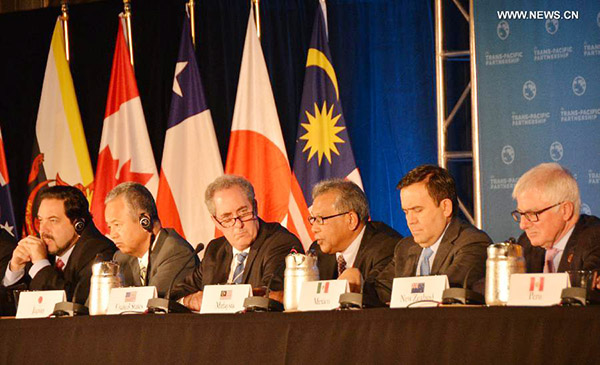TPP not start of an 'economic Cold War'
Updated: 2015-10-10 09:12
By Chu Yin(China Daily)
|
||||||||
 |
|
Trade ministers of the United States and 11 other Pacific Rim countries attend a press conference after negotiating the Trans-Pacific Partnership (TPP) trade agreement in Atlanta, the United States, on Oct. 5, 2015. Trade ministers of the United States and 11 other Pacific Rim countries "have successfully concluded" the Trans-Pacific Partnership (TPP) free trade talks, U.S. Trade Representative Michael Froman said Monday. [Photo/Xinhua] |
The heated discussion in China about whether the country should seek to join the Trans-Pacific Partnership indicates people's uncertainty about the prospects for China's rise and economic transformation.
How Chinese people see the interaction and competition between China and other countries is likely to have a deep influence on China's future development.
The TPP as it is, if it comes into effect, already constitutes a practical threat to China's influence and position in the promotion of regional cooperation in the Asia-Pacific.
However, there are some favorable elements in the TPP that China can make good use of.
After the agreement was signed, China's economic influence has become an "internal" factor for the 12 signatory countries of the TPP. But the people thinking it will start an "economic Cold War" are actually assigning to the TPP a "mission impossible".
To begin with, although the TPP reflects the United States' strategic intention of returning to Asia, it is still a framework for regional economic integration. The direction of free trade it represents is in line with the needs of China's development and rise.
As a high-standard comprehensive free trade agreement, the TPP does pose some challenges to the lagging-behind sectors of the Chinese economy, but the challenges are also opportunities for the advanced parts of the Chinese economy.
Although it will take time for China to reach the standards of the TPP in some aspects, such as its State-owned enterprises, labor standards and government procurement, and in some regions in China, there is the possibility and space for the local industries to make progress and meet the standards of the TPP.
- Global health entering new era: WHO chief
- Brazil's planning minister steps aside after recordings revelation
- Vietnam, US adopt joint statement on advancing comprehensive partnership
- European border closures 'inhumane': UN refugee agency
- Japan's foreign minister calls A-bombings extremely regrettable
- Fukushima impact unprecedented for oceans: US expert

 Stars of Lijiang River: Elderly brothers with white beards
Stars of Lijiang River: Elderly brothers with white beards
 Wealthy Chinese children paying money to learn British manners
Wealthy Chinese children paying money to learn British manners
 Military-style wedding: Fighter jets, grooms in dashing uniforms
Military-style wedding: Fighter jets, grooms in dashing uniforms
 Striking photos around the world: May 16 - May 22
Striking photos around the world: May 16 - May 22
 Robots help elderly in nursing home in east China
Robots help elderly in nursing home in east China
 Hanging in the air: Chongqing holds rescue drill
Hanging in the air: Chongqing holds rescue drill
 2.1-ton tofu finishes in two hours in central China
2.1-ton tofu finishes in two hours in central China
 Six things you may not know about Grain Buds
Six things you may not know about Grain Buds
Most Viewed
Editor's Picks

|

|

|

|

|

|
Today's Top News
Liang avoids jail in shooting death
China's finance minister addresses ratings downgrade
Duke alumni visit Chinese Embassy
Marriott unlikely to top Anbang offer for Starwood: Observers
Chinese biopharma debuts on Nasdaq
What ends Jeb Bush's White House hopes
Investigation for Nicolas's campaign
Will US-ASEAN meeting be good for region?
US Weekly

|

|







